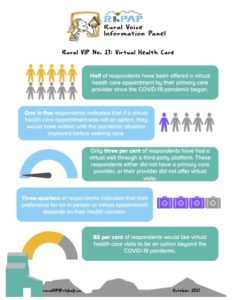In response to the COVID-19 pandemic, Alberta Health changed the physician fee schedule to allow physicians to provide virtual health care to their patients. To reduce the risk of COVID-19 transmission, many clinics began offering virtual visits when possible. For the October Rural VIP survey, we asked the Rural Voice Information Panel (Rural VIP) members about their experiences with, and opinions on, virtual health care.
Virtual health care is the remote delivery of health services from a health-care provider to a patient in a different location. These health services may be provided by e-mail, telephone, video call, or through specialized application platforms. Virtual visits can be more convenient to patients as they can receive care from anywhere, including their own home or place of work. Virtual visits may be especially beneficial to rural residents, increasing access to general and specialized health-care services without the need for travel.
Key findings
Half of respondents have been offered a virtual appointment by their primary care provider since the COVID-19 pandemic began. Most of these virtual appointments have been over the phone (86 per cent), but some were over video call or email.
If a virtual appointment was not an option, 70 per cent of respondents indicated that they would have had an in-person appointment at their provider’s clinic instead. However, 20 per cent of respondents would have waited to have an appointment until the pandemic situation improved. When asked whether they prefer in-person or virtual appointments, three-quarters of respondents indicated that it depends on their health concern.
Three per cent of respondents have used a third-party platform (such as Maple or Babylon) for a virtual appointment. These respondents used these platforms because they don’t have a primary care provider, their primary care provider does not offer virtual appointments, or because it allows them to consult with specialists from outside their region without requiring travel.
Overall, 82 per cent of respondents would like virtual health care to remain an option beyond the COVID-19 pandemic.
Next steps

Although only half of respondents have had a virtual health care appointment, most (82 per cent) see the benefit in virtual health care and would like it to remain an option in the future.
As we do each month, RhPAP will share these learnings and feedback with Alberta Health and the RhPAP Board of Directors, who represent the following organizations: Alberta Health Services, the Alberta Medical Association, the College of Physicians and Surgeons of Alberta, Rural Municipalities of Alberta, and the College and Association of Registered Nurses of Alberta. We may also share this information with other relevant health professional organizations for their consideration.
Click here for a full version of the Rural VIP Summary No. 21.
